The conference of Russian compatriots in Schwerin several days back was quite an unusual one: for the first time in many years the discussion focused on such a large number of polemic questions. The forum attracted participants from all across German. They included representatives of various ethnic groups and confessions: Germans, Russian, Ukrainians, Chechens, Tatars and others, Orthodox, Jews, Catholics, Evangelists, Muslims and, of course, atheists.
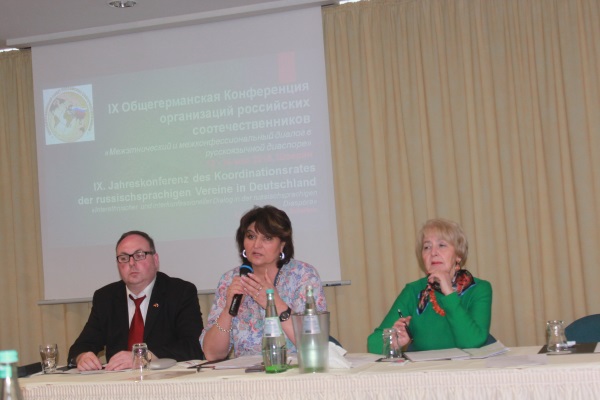
The theme of the conference, at the suggestion of the All-Germany Coordination Council of Russian Compatriots, was “Interethnic and Interconfessional Dialogue in the Russian-Language Diaspora”, which brought together all of these different people, leaders of public organizations, who are united by the Russian language and respect for Russia.
The delegation from Russia was also quite impressive. Federation Council Senator Igor Morozov, who is responsible for work with compatriots in the International Affairs Committee, came to Schwerin for the forum. Russian Ambassador to German Vladimir Grinin was also on hand to open the meeting. Rossotrudnichestvo was represented by Oleg Ksenofontov, director of the Russian House of Science and Culture in Berlin, and the Moscow Compatriot House was represented by Yuri Kaplun. Vladimir Kochin, Executive Director of the Russkiy Mir Foundation, also spoke at the forum.
The participants of the forum were welcomed by Vice Oberbürgermeister of Schwerin Bernd Nottebaum as well as Helmut Holter, the head of the Left party in the Landtag of Mecklenburg-Vorpommern. Herr Holter’s speech, which was delivered fully in Russian from beginning to end with quotes of Vladimir Soloviev and Russian classics, was greeted with applause.
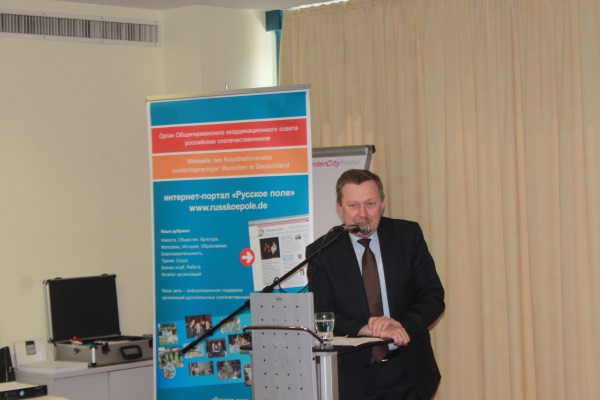
The remarks of representatives of the Russian-speaking diaspora were devoted to contemporary societal problems in Germany. Larisa Yurenko, head of the All-Germany Coordination Council of Russian Compatriots, spoke about the work of compatriot organizations in the country. Vera Tatarnikova noted the negative information environment which German media have fostered and incidents of Rusophobia which have occurred as a result.
The difficult relations within the Russian-speaking diaspora in light of the continuing conflict in Ukraine were the focus of an emotional speech by Yulia Rybalko, who heads a Russian-German-Ukrainian NGO in Saarland: herself a Ukrainian, she does not accept the nationalism and Russophobia which is flourishing today in Ukraine.
The apprehension and anxiety could be heard in the speeches of representatives of the Muslim community: why is the word “Islam” associated with aggression around the world? Venera Vagizova, Diter Valiev and Abdul-Malik Arsanukaev in their remarks expressed the opinion of the majority of Muslims: Islam is peace, and it should never be confused with those movements which pervert the essence of Islam and do not have anything in common with it.
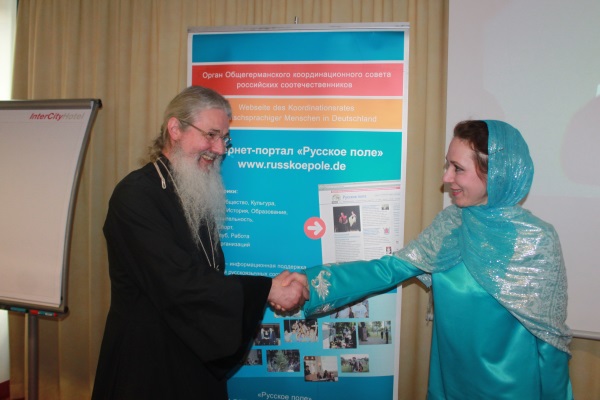
Father Nikolai Artemov from Bavaria, a representative of the Russian Orthodox Church Outside Russia, concluded this polemic: he called on all participants of the conference to listen to each other – only through listening can a mutual understanding develop. The truth in his could words could be seen in the discussions on the sidelines of the forum: representatives of all confessions warmly conversed with the Orthodox priest.
Many other interesting speeches were made at the forum: Pavel Miloslavin, theater director and future rabbi, enthused the auditorium with his energy and optimism. He proposed a project to use theaters to develop interconfessional dialogue and inoculate children with historical traditions. Sergei Zazykin appealed to the authorities of Russia and Germany to make use of the unrealized potential of Russian-speaking teachers and trainers for working with children. Representatives of youth organizations Katerina Horsun (Munich), Roman Khitov and Nadezhda Schmidt (Berlin) spoke about their work experience.
Juri Eremenko, editor of Russkoe Pole, spoke about the unique features of communication of Russian-speaking online and noted the fact that the internet and social networks have taken the diaspora movement to a qualitatively new level.
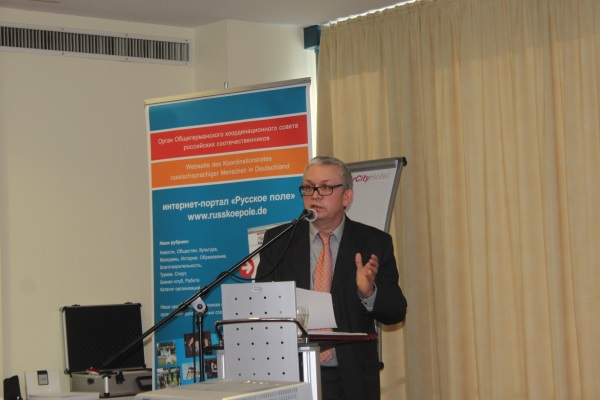
The proceedings of the entire congress of compatriots in Schwerin demonstrated how much such meetings are needed. Despite the fact that all speeches and discussions adhered to the official program and schedule, the delegates lingered on to continue their conversations after the official conclusion.
On the first day of the forum, during the evening after dinner a meeting was held between members of the All-Germany Coordination Council of Russian Compatriots and Igor Morozov, a member of the Federation Council. Many were already acquainted with him from his years of work as deputy head of Rossotrudnichestvo, but here they had the first opportunity to engage with Igor Morozov as a politician and senator, as a member of the International Affairs Committee of the Federation Council. In the informal and friendly conversation, they discussed a myriad of questions: the Ukrainian crisis, participation of the Russian-speaking diaspora in the political movements of the countries where they reside, as well as the preservation of Russian language and culture.
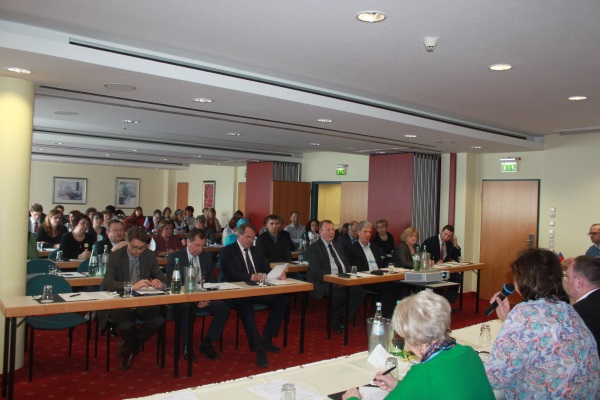
The members of the All-Germany Coordination Council of Russian Compatriots agreed that the Russian-speaking citizens of Germany should more actively engage in public political affairs. However, the All-Germany Coordination Council of Russian Compatriots itself should remain an apolitical platform, as this organization unites members of various political parties. Civil society is very well developed in Germany and has a direct impact on government policy, which means that public initiatives are the most effective route for the Russian-speaking diaspora to have an impact in the country.
During the work of the forum the participants discussed the preparation of future events, including such important ones as the conference in Berlin “Germany and Russia – from War to Peace” (September 2015), a countrywide youth conference with the working title “The Role of the Youth Movement in Contemporary German-Russian Relations” (Erfurt, October 2015) as well as roundtable on the Russian language (Hamburg), a roundtable on “Preservation of the Historical Cultural Heritage Abroad and the Upbringing of the Young Generation” (Wuppertal) and others.
Juri Eremenko,
Schwerin-Erfurt, Germany












